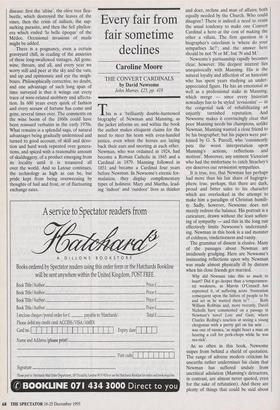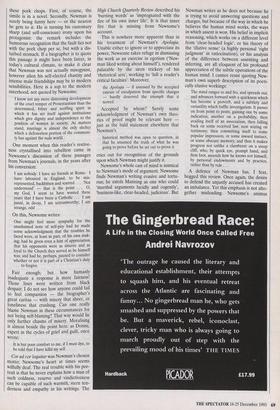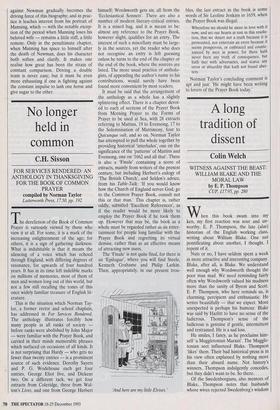Every fair from fair sometime declines
Caroline Moore
THE CONVERT CARDINALS by David Newsome John Murray, £25, pp. 418 This is a 'brilliantly double-harnessed biography' of Newman and Manning, as the jacket informs us; and within the book the author makes eloquent claims for the need to steer his team with even-handed justice, even when the horses are laying back their ears and snorting at each other. Newman, who was ordained in 1924, had become a Roman Catholic in 1845 and a Cardinal in 1879. Manning followed in 1851 and became a Cardinal four years before Newman. In Newsome's eirenic for- mulation, they display complementary types of holiness: Mary and Martha, lead- ing 'indoor' and 'outdoor' lives as thinker and doer, recluse and man of affairs; both equally needed by the Church. Who could disagree? There is indeed a need to resist the usual tendency to make one Convert Cardinal a hero at the cost of making the other a villain. The first question in a biographer's catechism is 'where do your sympathies lie?'; and the answer here should be not 'N or M', but 'N and M.'
Newsome's partisanship rapidly becomes clear, however. His deepest interest lies unequivocally with Manning. His is the natural loyalty and affection of an historian who has spent years studying an under- appreciated figure. He has an emotional as well as a professional stake in Manning, which merge — since every historian nowadays has to be styled 'revisionist' — in the congenial task of rehabilitating an unjustly tarnished reputation. And Newsome makes it convincingly clear that poor Manning needs his champions, unlike Newman. Manning wanted a close friend to be his biographer; but his papers were pur- loined by G. S. Purcell, who 'consistently puts the worst interpretation upon Manning's actions, reflections and motives'. Moreover, any eminent Victorian who had the misfortune to catch Strachey's eye deserves our revisionist sympathies.
It is true, too, that Newman has perhaps had more than his fair share of hagiogra- phers; true, perhaps, that there are dark, proud and bitter sides to his character which are overlooked in the attempt to make him a paradigm of Christian humili- ty. Sadly, however, Newsome does not merely redress the balance. His portrait is a caricature, drawn without the least soften- ing of sympathy — and this in the long run effectively limits Newsome's understand- ing. Newman in this book is a sad monster of coldness, vindictiveness and vanity.
The grammar of dissent is elusive. Many of the passages about Newman are insidiously grudging. Here are Newsome's insinuating reflections upon why Newman was made almost physically ill by distress when his close friends got married.
Why did Newman take this so much to heart? Did it go deeper than a temperamen- tal weakness, as Marvin O'Connell has expressed it, of suffering acute 'frustration consequent upon the failure of people to be and act as he wanted them to'? ... Both William Robbins and, more recently, David Nicholls have commented on a passage in Newman's novel Loss and Gain, where Charles Reding's reaction at seeing a young clergyman with a pretty girl on his arm . was one of nausea, 'as might beset a man on hearing a call for pork-chops while he was sea-sick'.
As so often in this book, Newsome snipes from behind a shield of quotation. The range of adverse modern criticism he unearths rather undermines his claim that Newman has suffered unduly from uncritical adulation (Manning's detractors, in contrast, are almost never quoted, even for the sake of refutation). And there are plenty of things that could be said about these pork chops. First, of course, the simile is in a novel. Secondly, Newman is surely being funny here — or the nearest he gets to it. He is turning his customary sharp (and self-conscious) irony upon his protagonist: the remark includes the humorous recognition that the fault lies not with the pork chop per se, but with a dis- turbed stomach. If a biographer is to quote this passage it might have been fairer, in today's cultural climate, to make it clear that Newman was not actually misogynist, however alien his self-elected chastity and intense male friendships may be to modern sensibilities. Here is a sop to the modern sisterhood, not quoted by Newsome:
I know not any more distressing development of the cruel temper of Protestantism than the determined, bitter and scoffing spirit in which it has set itself against institutions which give dignity and independence to the position of women in society. As matters stand, marriage is almost the only shelter which a defenceless portion of the communi- ty has against the rude world.
One moment when this reader's restive- ness crystallised into rebellion came in Newsome's discussion of these passages from Newman's journals, in the years after his conversion:
I am nobody. I have no friends at Rome. I have laboured in England, to be mis- represented, backbitten and scarred . . . Not understood' — that is the point . . . 0, my God, I seem to have wasted these years that I have been a Catholic ... I am passé, in decay, I am untrustworthy; I am strange, odd ...
On this, Newsome writes:
One might feel more sympathy for the unashamed note of self-pity had he made some acknowledgment that the troubles he faced were, at least in part, of his own mak- ing; had he given even a hint of appreciation that his opponents were as sincere and as loyal to the Church they served as he himself was; and had he, perhaps, paused to consider whether or not it is part of a Christian's duty . to forgive.
Fair enough; but how humanly inadequate a response is mere fairness! Those lines were written from black despair: I do not see how anyone could fail to feel compassion — the biographer's great caritas — with misery that sheer, or loneliness that crushing. Can one really blame Newman in these circumstances for not being self-blaming? That way would lie only further chasms of misery. Moralising is almost beside the point here: as Donne, expert in the cycles of grief and guilt, once wrote:
It is but poor comfort to me, if I must dye, to be told that I have killd my self.
Cor ad cor loquitur was Newman's chosen motto; Newsome's heart at times seems wilfully deaf. The real trouble with his por- trait is that he never explains how a man of such coldness, reserve and vindictiveness can be capable of such warmth, stern ten- derness and empathy in his writings. The High Church Quarterly Review described his `burning words' as 'impregnated with the fire of his own inner life'. It is that inner fire that is missing from Newsome's account.
This is nowhere more apparent than in his treatment of Newman's Apologia. Unable either to ignore or to appreciate its power, Newsome takes refuge in dismissing the work as an exercise in egotism ('New- man liked writing about himself), rendered palatable by the siren trickery of his `rhetorical arts', working to 'lull a reader's critical faculties'. Moreover, the Apologia — if assessed by the accepted canons of exculpation from specific charges — hardly deserved the triumph that it scored.
Accepted by whom? Surely some acknowledgment of Newman's own theo- ries of proof might be relevant here just as the bald statement elsewhere that Newman's
historical method was open to question, in that he assumed the truth of what he was going to prove before he set out to prove it
cries out for recognition of the grounds upon which Newman might justify it.
Newsome's whole cast of mind is inimical to Newman's mode of argument. Newsome finds Newman's writing evasive and tortu- ous; he extols Manning as one who could `marshal arguments lucidly and cogently', `business-like, clear-headed, judicious'. But Newman writes as he does not because he is trying to avoid answering questions and charges, but because of the way in which he believes the human mind works, the ways in which assent is won. His belief in implicit reasoning, which works on a different level from 'clear-headed logic', or his theory of the 'illative sense' (a highly personal 'right judgment' in ratiocination), or his analysis of the difference between assenting and inferring, are all eloquent of his profound appreciation of the subtle operations of the human mind. I cannot resist quoting New- man's own superb description of its poeti- cally elusive workings:
The mind ranges to and fro, and spreads out, and advances forward with a quickness which has become a proverb, and a subtlety and versatility which baffle investigation. It passes on from point to point, gaining one by some indication; another on a probability; then availing itself of an association; then falling back on some received law; next seizing on testimony; then committing itself to some popular impression, or some inward instinct, or some obscure memory; and thus it makes progress not unlike a clamberer on a steep cliff, who, by quick eye, prompt hand, and firm foot, ascends how he knows not himself, by personal endowments and by practice, rather than by rule . . .
A defence of Newman has, I fear, hogged this review. Once again, the desire to defend the unjustly accused has created an imbalance. Yet this emphasis is not alto- gether misleading. Newsome's animus against Newman gradually becomes the driving force of this biography; and in prac- tice it leaches interest from his portrait of Manning, which — with the notable excep- tion of the period when Manning loses his beloved wife — remains a little stiff, a little remote. Only in the penultimate chapter, when Manning has space to himself after the death of Newman, does his character both soften and clarify. It makes one realise how great has been the strain of constant comparison. Driving a double team is never easy; but it must be even more exhausting if one is fighting against the constant impulse to lash one horse and give sugar to the other.












































































































 Previous page
Previous page